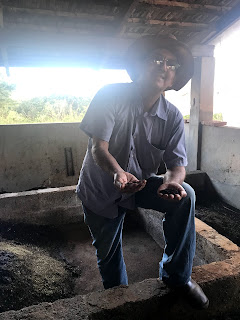While touring all over Brazil, the Hawkeye
Community College study abroad group was able to see a vast variety of
different crops in production. Our group was able to see corn and soybean
fields, coffee trees, large greenhouses full of rice and beans, cotton
productions, and much more. One of my favorite farms we visited, and in my mind
the most beautiful, was the organic farm. Fazenda Organica Novas Senhora
Aparecida was the name of the organic farm we visited. It is located in the
country and is very remote. It is run by a farmer who has only a handful of
workers and college interns. It’s also a learning facility where people can
come visit and learn about organic farming.
After seeing the Macaws we started
the organic farm tour. This farmer had just about every plant you could imagine
growing in his fields. He had corn, soybeans, sugar cane, peanuts, bananas,
papayas, coffee, etc. We were able to tour all of the fields and hear him speak
about how he cares for and harvest each group organically. The banana trees
were my favorite to see because of how many he had and how absolutely beautiful
they were. My second favorite was the sugar cane because of how big and green
it was. He even let us try both the bananas and sugar cane. His whole farm was
so green, luscious, and beautiful that it was almost breathtaking.
We ended the organic farming tour
by visiting the farmer’s worm composting barn. In his barn he had several
cement pens that were filled with compost. He then had several worms in each
pen to help break down the compost. He then puts the compost back onto his
field for a form of organic fertilizer once the worms have broken the food and
compost down completely. This was very unique and different and the first time I
have ever seen anything like that. It would be a great practice to implement
for organic farmers back in the United States. Our time spent at the organic
farm was full of great views, new insights, and a lot of learning.






No comments:
Post a Comment